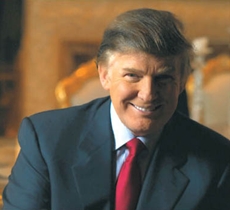Confusion prevails as US top court partly upholds Trump travel ban
29 Jun 2017
The Donald Trump administration in the US on Wednesday set new criteria for visa applicants from six mainly Muslim nations, after the Supreme Court partially restored President Trump's executive order that was widely criticized as a ban on Muslims and all refugees.
 Under the new rules, only those with a "close" family or business tie to the United States will be granted visas.
Under the new rules, only those with a "close" family or business tie to the United States will be granted visas.
Visas that have already been approved will not be revoked, but instructions issued by the State Department say that new applicants from Syria, Sudan, Somalia, Libya, Iran and Yemen must prove a relationship with a parent, spouse, child, adult son or daughter, son-in-law, daughter-in-law or sibling already in the United States to be eligible.
The same requirement, with some exceptions, holds for would-be refugees from all nations who are still awaiting approval for admission to the US.
Grandparents, grandchildren, aunts, uncles, nieces, nephews, cousins, brothers-in-law and sisters-in-law, fiancees or other extended family members are not considered to be close relationships, according to the guidelines that were issued in a cable sent to all US embassies and consulates late on Wednesday. The new rules take effect from Midnight GMT on Friday, according to the cable, which was obtained by sections of the media.
As far as business or professional links are concerned, the State Department said a legitimate relationship must be "formal, documented and formed in the ordinary course rather than for the purpose of evading" the ban.
Journalists, students, workers or lecturers who have valid invitations or employment contracts in the US would be exempt from the ban. The exemption does not apply to those who seek a relationship with an American business or educational institution purely for the purpose of avoiding the rules, the cable said. A hotel reservation or car rental contract, even if it was pre-paid, would also not count, it said.
Consular officers may grant other exemptions to applicants from the six nations if they have "previously established significant contacts with the United States; ''significant business or professional obligations" in the US; if they are an infant, adopted child or in need of urgent medical care; if they are travelling for business with a recognised international organisation or the US government or if they are a legal resident of Canada who applies for a visa in Canada, according to the cable.
Widespread confusion
Critics said they are watching closely to see how the guidelines are used, as there seems to be considerable confusion about them.
As of Wednesday, most of the main federal departments and agencies responsible for implementing the ban had not issued official legal guidance to their staff in the field or to the public. There was only the State Department cable, which makes it compulsory for travellers to have a "close" family or business tie with the United States.
Different organisations around the US have expressed confusion at the ban. The University of Illinois said that 200 people associated with it would be affected. That includes students, faculty, staff and prospective students.
"We are cautiously optimistic that there will not be any need for worry, we believe that the university is a bona fide entity for which you could have a relationship with," said Martin McFarlene, the Student Services Director at the University.
But since nobody knows exactly what that means, the university can't warn the community.
"When they come to us and say can I travel, we should be able to give them a straight answer. The fact that we can't is incredibly frustrating not just to us, but for them as well," added McFarlene. The department is worried this could affect future students the most.
Jeffrey Thielman of the International Institute of New England spent much of Monday trying to figure out just who will be exempted from the travel ban, reported WBUR. The institute resettles hundreds of immigrants annually from countries including those under the temporary travel ban.
"I guess if you have a brother or a sister or a parent in the country, then maybe you're in," he said. "So it's still very confusing, and we're going to need some clarity soon."
US Department of Homeland Security (DHS) secretary John Kelly said on Wednesday he told the DHS employees that he wants to tread carefully in implementing the order. ''I told my folks I didn't want to come anywhere near close to getting crosswise with the court. I think that's the right way to be a public servant,'' Kelly said, adding that he expects the government will win the case when it is heard this fall.
David Lapan, a DHS spokesman, said additional information will be released today, the day the ban is to start. A justice department spokesman declined to comment to media queries.
The Supreme Court specifically mentioned family ties and job or university offers as reasons to exempt someone from the ban, but did not mention such issues as business or professional conference travel. Airlines in the region said they had not received a directive from the United States, and there were few people at the US Consulate General in Dubai, where there is normally a line out the door of people waiting to process visa applications.
The US Department of State has said it does not plan to cancel previously scheduled visa appointments for residents of the six countries.
Trump issued the ban in an executive order on 6 March earlier this year, saying it was a temporary measure needed to allow the administration to review the vetting process for immigrants from those countries. Travel from the six countries was banned for 90 days and for all refugees for 120 days. But lower courts in Maryland and Hawaii blocked the order, saying it was a pretext for targeting Muslims and violated the US Constitution's prohibition on favoring one religion over another. The Supreme Court then narrowed the scope of the lower court injunctions.
The US Department of State on Tuesday said the United States has already admitted about 49,000 refugees for the fiscal year ending in September, while Trump's executive order set a cap of 50,000. The court's decision allows the cap to take effect, but only against those who do not have a ''bona fide'' connection.
"Initial reports suggest that the government may try to unilaterally expand the scope of the ban - for example, by arbitrarily refusing to treat certain categories of familial relationships as 'bona fide.' These reports are deeply concerning. We are watching for official word," said Omar Jadwat, director of the ACLU's Immigrants' Rights
On Monday, the Supreme Court partially lifted lower court injunctions against Trump's executive order that had temporarily banned visas for citizens of the six countries, but the court offered only broad guidelines - suggesting they would include a relative, job offer or invitation to lecture in the US - as to how that should be defined.
Senior officials from the departments of State, Justice and Homeland Security had reportedly laboured since the decision to clarify the ruling and Wednesday's instructions were the result.
The new guidance will remain in place until the Supreme Court issues a final ruling on the matter. Arguments before the justices will not be held until at least October, so the interim rules will remain in place at least until the fall.


















